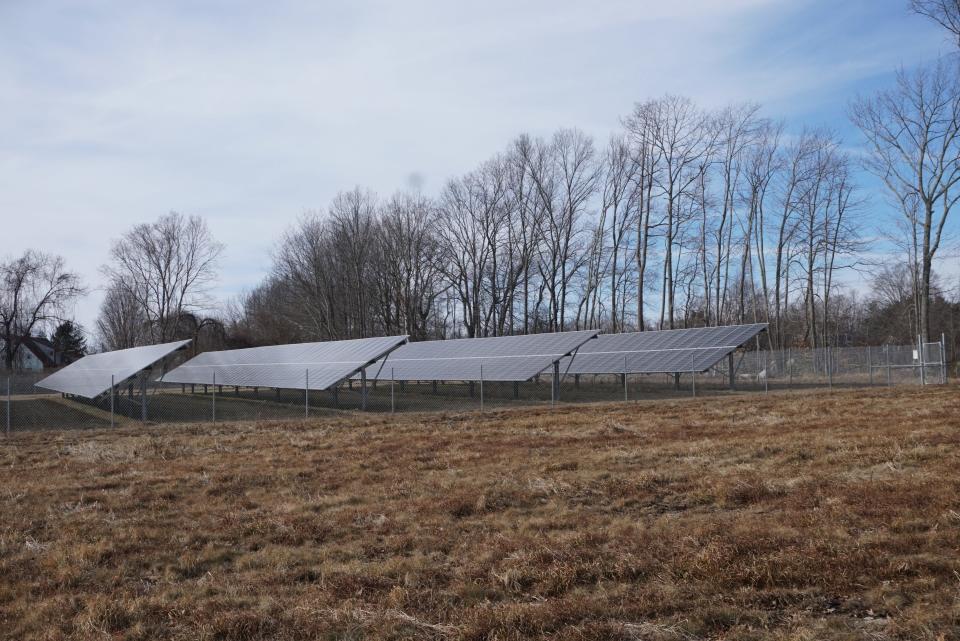Solar development can mean a loss of open space. These bills aim to control that in Rhode Island.

PROVIDENCE — In one important area, Rhode Island’s policies around the environment are at odds with each other. The state is pushing for more solar power and other forms of renewable energy to battle climate change, but much of that new development means tearing down forests and otherwise losing open space.
In the latest effort aimed at stopping deforestation caused by the installation of sprawling fields of ground-mounted solar panels, the General Assembly is considering a package of legislation that aims to guide where big solar projects are built.
At a Senate hearing Wednesday, supporters of the bills said that change is needed because the state has struggled to direct the development of solar farms that have proliferated in recent years on the back of favorable incentives.
“Solar is by far the biggest contributor to forest loss in Rhode Island and has been for the last many years,” said Sue AnderBois, climate and energy program manager for The Nature Conservancy.
Rhode Island's recycling rate is low:Here's why, and what can be done to help.
Where should solar developments be built? This bill says landfills, brownfields, gravel pits
One of the bills heard by the Committee on Environment and Agriculture would direct solar development to landfills, gravel pits and other brownfields sites that are generally more difficult to build on than undisturbed green space. It would create an inventory of contaminated and industrial sites and set up a fund to help pay the costs of interconnecting solar projects on those lands to the power grid.
The legislation was introduced by Sen. Alana DiMario, chair of the committee, as was another that would designate areas of “core forest” — unfragmented forest blocks of at least 250 acres – and deter nearly all solar development on those lands.
Should Rhode Island remove the cap on rooftop installations?
A third bill, introduced by Sen. Bridget Valverde, tackles the other side of the solar issue. While critics say that not enough is being done to regulate solar development in green spaces, they also argue that the restrictions are too tight on rooftop installations in places that have already been developed for housing and commercial uses. Valverde’s bill would remove a cap on the size of such installations while adjusting so-called net-metering credits.
Qualifying for incentives
The focus of Wednesday’s hearing was the core forest bill, which a number of state environmental groups have described as their priority this General Assembly session. Just as with the rooftop solar legislation, it would affect how projects qualify under the state’s net-metering program, which pays developers inflated rates for renewable energy and has become a leading driver of the expansion in the state’s solar capacity over the last five years or so.
The program arguably has been too successful in generating development — to the point that a coalition of groups working on solar siting supports the legislation, which would exclude projects in core forest areas from qualifying for the incentives.
Expanding the state's net-metering program
At the same time, however, the bill would expand the size of the state’s net metering program. In short, it would support more solar power in Rhode Island but restrict where installations could be built.
There have been previous efforts to control solar development in the state, as well as separate bills to expand net metering. This is the first time the two have been combined, bringing together conservation groups alongside solar developers.
“We understand what role we play in deforestation in this state and at some point you have to know when something is coming and join in hopes that it won’t be too detrimental to your business,” said Nicholas Nybo, a lawyer for Revity Energy.
Not everyone’s on board, however. Rhode Island Energy, the state’s dominant electric utility, opposes the forest bill, arguing that expanded net metering would raise costs for ratepayers.
“Net metering may have a place in our state policy portfolio,” said Nick Ucci, a lobbyist for the company, "but as is, it is a program untethered from the benefits of market-based competition.”
Citing this past winter’s spike in electric rates, Sen. Gordon Rogers said he wanted to see a cost-benefit analysis before the legislation goes forward.
“Until I see that," he said, "I can’t support it as it’s written."
DiMario pushed back, pointing to global factors that have driven demand for natural gas, which is seen as the prime reason for the winter rate increase.
“In terms of our electricity supply, we have renewable energy sources, which have a cost to them and some of those costs we can control,” she said. “The alternative is that our electricity supply is powered by fossil fuels particularly natural gas ... and those costs are rising as well.”
This article originally appeared on The Providence Journal: Bills aim to control loss of open space for solar development in Rhode Island

 Yahoo Autos
Yahoo Autos 